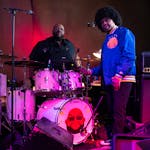Performing baroque music is not as easy for symphony orchestras as it used to be.
The past four decades have seen a revolution in our appreciation of playing styles in the baroque period, and specialist ensembles using historically accurate instruments have all but cornered the market in Bach, Handel and Vivaldi.
Is it still possible for a modern symphony orchestra to flip back to the baroque manner and make a convincing fist of rivaling the specialists in authenticity?
On Saturday evening, the Minnesota Orchestra proved that it is, in an ebullient performance of Cantatas 4, 5 and 6 from Bach's Christmas Oratorio.
The key ingredient was the presence of Scottish baroque specialist Nicholas Kraemer on the conductor's podium.
His influence was strongly felt in the lean, sprightly performance of Bach's Third Orchestral Suite that opened the concert.
Playing without vibrato — the quivery finger effect employed to richen tone — the violins zipped hyperactively through the infectious dance rhythms of the quicker movements while the famous "Air" lilted along with none of the gooeyness it's sometimes given.
A similar lightness of touch imbued the Christmas Oratorio cantatas that followed after intermission. They told the second part of the Christmas story that was begun in last December's Minnesota Orchestra performances of Cantatas 1-3.
For the Oratorio, the orchestra was pared down to roughly half its normal size and was joined by 49 singers from the Minnesota Chorale, plus four soloists.
Once again the key influencer was conductor Kraemer. Bobbing and jigging on the podium, he coaxed delectably incisive playing from the orchestra and exceptionally vivid singing from the choir.
Bach's sinuous oboe writing plays a prominent part in the Christmas Oratorio, and there was wonderfully fluid playing from principal oboe John Snow and associate principal Kathryn Greenbank.
In an unusual move, they were separated in "Flösst, mein Heiland," a so-called "echo aria" where Greenbank responded to Snow's onstage playing from a position on the first balcony of Orchestra Hall.
Beside her was Minnesota Chorale member Sara Payne, who similarly echoed phrases from soprano Sherezade Panthaki's mellifluous performance of the aria.
The nimble duetting of violinists Susie Park and Peter McGuire was a highlight of the tenor aria "Ich will nur dir zu Ehren leben," where soloist David Portillo did well to etch the coloratura runs at Kraemer's vertiginously zippy tempo.
Portillo was an ardently communicative narrator as the story moved from the christening of Jesus to the Wise Men's visit and Herod's murderous intentions.
Baritone Christopher Edwards briefly lent Herod a touch of pantomime villainy in the recitative "Ziehet hin und forschet fleissig," and sang the bass aria "Erleucht auch meine finstre Sinnen" with impressive solidity.
The English countertenor Robin Blaze made fluid contributions, and conductor Kraemer pulled the various strands of Bach's musical tapestry together in an invigorating performance of the closing chorus "Nun seid ihr wohl gerochen."
It was a joyful peroration, capped by Manny Laureano's exuberant rendition of the preposterously difficult solo that Bach gives his principal trumpet.
Terry Blain is a freelance classical music critic for the Star Tribune. Reach him at artsblain@gmail.com.




